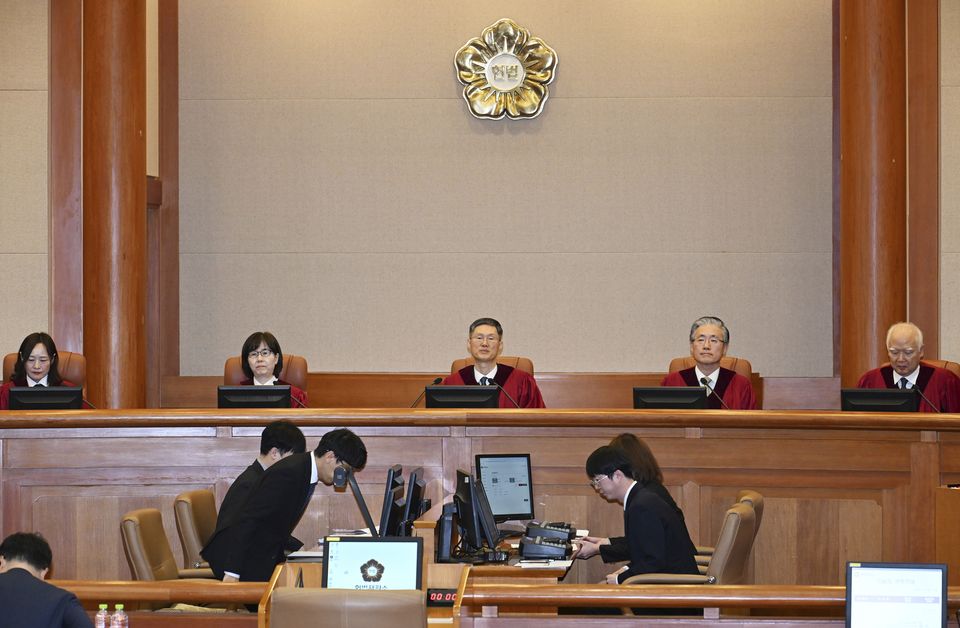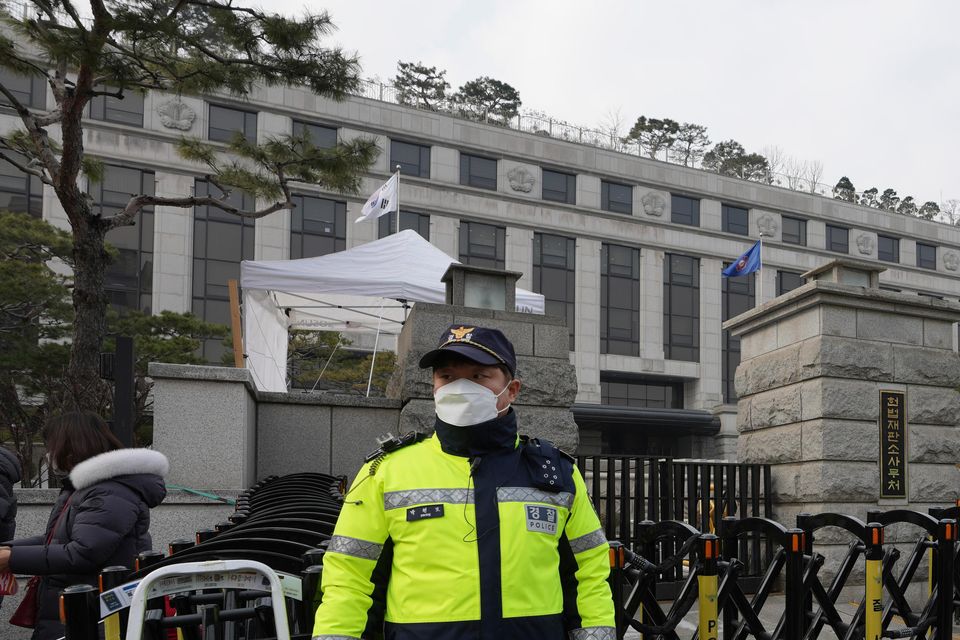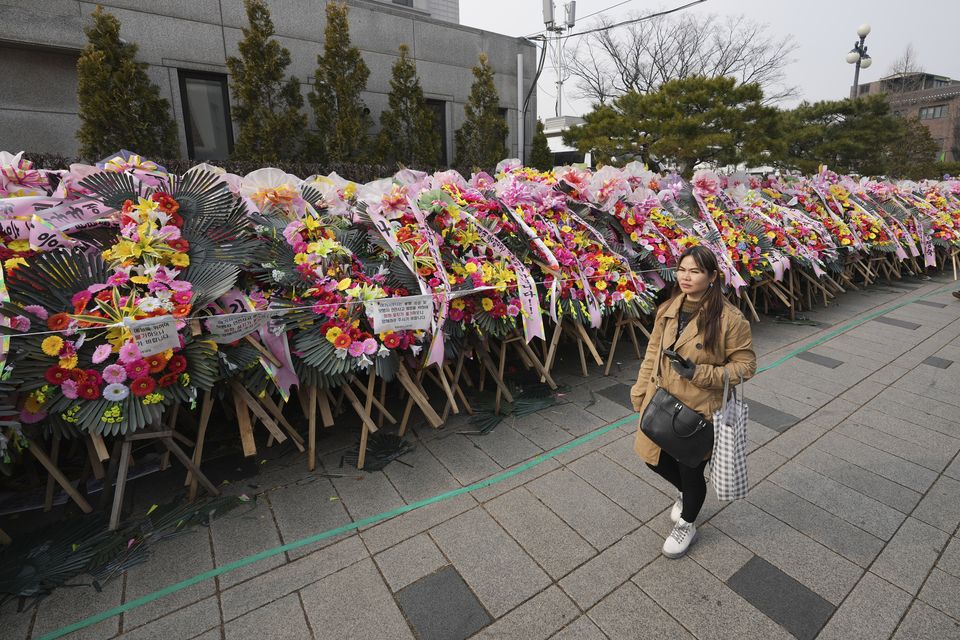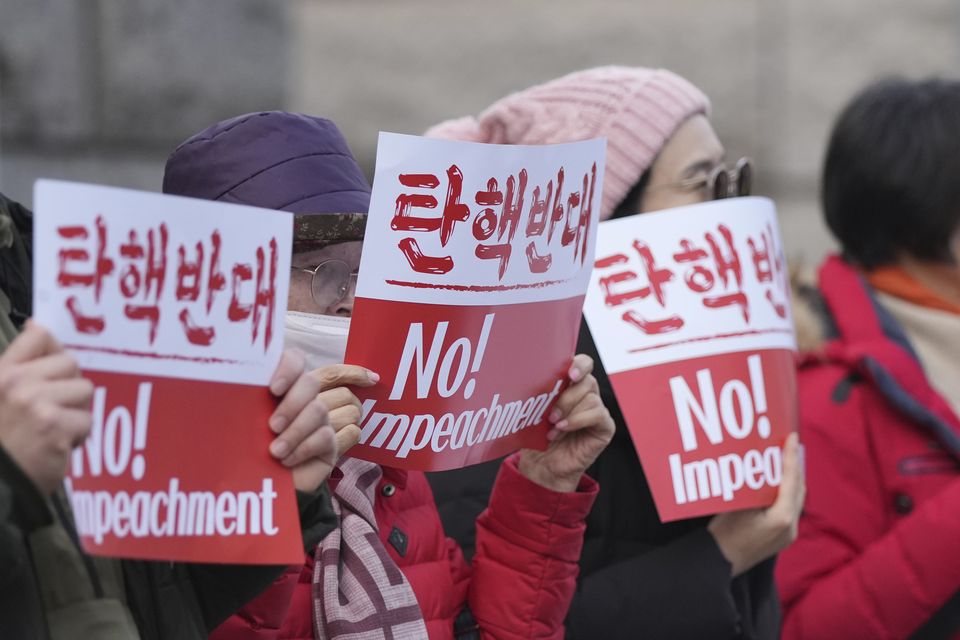The top aide of impeached South Korean President Yoon Suk Yeol pleaded with law enforcement agencies on Tuesday to abandon their efforts to detain him over his imposition of martial law last month, as authorities prepared a second attempt to take him into custody.
Presidential Chief of Staff Chung Jin-suk said Mr Yoon could instead be questioned at a “third site” or at his residence, and said the anti-corruption agency and police are trying to drag him out as if he was a member of a “South American drug cartel”.
However, one of the president’s lawyers said Mr Chung issued the message without consulting the legal team and they have no immediate plans to make the president available for questioning by investigators.
South Korea’s Constitutional Court sits for the first formal hearing of a trial on the validity of President Yoon Suk Yeol’s impeachment (Kim Min-Hee/Pool/AP)
Mr Yoon has not left his official residence in Seoul for weeks, and the presidential security service prevented dozens of investigators from detaining him after a stand-off on January 3 which lasted nearly six hours.
The Corruption Investigation Office for High-Ranking Officials and police pledged more forceful measures to detain Mr Yoon while they jointly investigate whether his brief martial law declaration on December 3 amounted to an attempted rebellion.
The National Police Agency has convened multiple meetings of field commanders in Seoul and nearby Gyeonggi province in recent days to plan their detainment efforts, and the size of those forces fuelled speculation that more than 1,000 officers could be deployed in a possible multiday operation.
The agency and police have openly warned that presidential bodyguards obstructing the execution of the warrant could be arrested.
South Korean police officers stand in front of the Constitutional Court in Seoul (Lee Jin-man/AP)
The anti-corruption agency and police have not confirmed when they might return to the presidential residence, which has been fortified with barbed wire and rows of vehicles blocking entry paths. But Mr Chung said he understood “D-day” to be Wednesday, without specifying the information he had.
Anti-corruption agency and police officials met representatives of the presidential security service on Tuesday morning for unspecified discussions regarding efforts to execute the detention warrant for Mr Yoon, the agency said. It was not immediately clear if any kind of compromise was reached.
Mr Yoon declared martial law and deployed troops around the National Assembly on December 3. It lasted only hours before politicians managed to get through the blockade and voted to lift the measure.
His presidential powers were suspended when the opposition-dominated assembly voted to impeach him on December 14, accusing him of rebellion.
His fate now rests with the Constitutional Court, which has begun deliberating on whether to formally remove him from office or reject the charges and reinstate him.
A woman passes wreaths sent by supporters of impeached South Korean President Yoon Suk Yeol outside the Constitutional Court in Seoul (Lee Jin-man/AP)
The Constitutional Court held its first formal hearing in the case on Tuesday.
The session lasted less than five minutes because Mr Yoon refused to attend, choosing to remain at his official residence while the detention warrant for him is active.
The next hearing is set for Thursday, and the court will then proceed with the trial whether or not he attends.
The country’s acting leader, Deputy Prime Minister Choi Sang-mok, raised concerns on Monday about potential clashes between authorities and the presidential security service, which, despite a court warrant for Mr Yoon’s detention, has insisted it is obligated to protect the impeached president.
The anti-corruption agency and police have “completed preparations for a siege”, Mr Chung said.
“They are ready to tear down the walls at any moment and handcuff President Yoon Suk Yeol, who remains isolated in his residence in Hannam-dong, and forcibly remove him,” he added, accusing investigators of trying to humiliate the president.
Supporters of impeached South Korean President Yoon Suk Yeol stage a rally outside the Constitutional Court in Seoul (Lee Jin-man/AP)
“Thousands of citizens are staying up through the night in front of the presidential residence, vowing to protect the president. If a conflict were to break out between the police and citizens, an unimaginable tragedy could occur.”
Over the past two weeks, thousands of anti-Yoon and pro-Yoon protesters have gathered daily in competing rallies near his office in Seoul, anticipating another detention attempt.
Mr Yoon’s lawyers have claimed images of him being dragged out in handcuffs could trigger a huge backlash from his supporters and spark a “civil war” in a country deeply divided over ideological and generational lines.
In preventing Mr Yoon’s detention on January 3, presidential bodyguards were assisted by troops assigned to guard the presidential residence under the command of the presidential security service.
However, a Defence Ministry spokesman said on Tuesday that the troops will no longer participate in efforts to block the execution of Mr Yoon’s detention warrant and will focus solely on guarding the compound’s perimeter.



